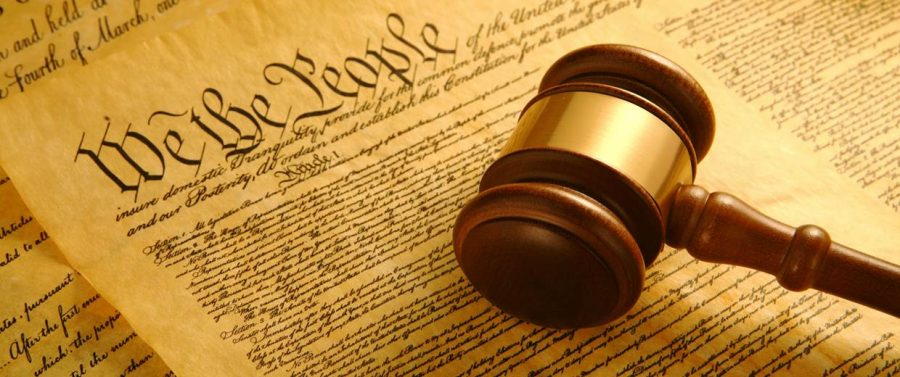The Voting Age in the United States of America
What should be done about our voting age, and why?
The Constitution lays out Articles that the United States wants to abide to, with Amendments being added along the way. Photo and credits to Getty Images – United States Constitution and Gavel
January 27, 2020
The United States’ Constitutional Amendment, numbered as the 26th, reads “The right of citizens of the United States, who are eighteen years of age or older, to vote shall not be denied or abridged by the United States or by any State on account of age.” This was put into place to set the voting age to 18 years old. Now, people of all sorts want it back to the way it was, set at an older 21 years with the 14th Amendment. Others want it to be lowered even farther, bringing it down to a younger 16 years old. The question that fills everyone’s minds, which is the correct way of the spectrum? Would the United States benefit from raising the voting age or lowering it?
For around 183 years, the voting age in the United States was 21, what the founding fathers thought was fair at the time. Around the time of Vietnam, people argued that people who go to war should also be able to vote, and that age was 18. So, in 1971 the Twenty-Sixth Amendment was ratified, and no state could make the Voting Age greater than 18 years old. Ever since then, we’ve argued each and every way the voting age could go, and with generations of people, arguments have changed.
Right now, a very common argument for the voting age is to lower it. The National Youth Rights Association is a part of that majority at the moment. An argument that they push is that many young people under 18 have serious adult responsibilities already, so they should also be able to do what most adults do, and vote. They list how people younger than 18 can publish a new piece of literature, work on cancer research, or even win the great Nobel Prize. They say that if they can do all that successfully, why should voting be restricted from them?
Australia adds on with the Foundation for Young Australians, and Marta Malchevski, being a member, speaks about the voting age cases down under. Australia and the United States are alike in Democracy, so when she makes a key point, it can also be applied here. “The 2019 version of this is if 16 year olds pay tax, they should have a say in where that tax goes. And if 16 year olds work, they pay tax. Additionally, young people are affected daily by government regulation on education, healthcare, taxation—shouldn’t they be given a voice?” Malchevski voices, making a great concern. Since 16 is the age of consent, they could also become parents, work for a living, drive, consent to medical procedures, and also serve in the military. “Shouldn’t they be given a voice?”
Fairvote.org, an organization on the basis of fair voting in Democracy, including the United States of America, makes a similar argument, even adding on to it. To prove that it works in practice they give evidence of nations, like Germany and the United Kingdom. If these great nations have extended voting rights to 16-year-olds for national, regional, and local elections, why shouldn’t everyone else? It seems to work well, what about the other side of the argument?
On the complete other side of the scope, there is an argument of raising the voting age back to 21 with the enforcement of the 14th amendment. A source from the Foundation for Economic Education, J.K. Baltzersen, gives an outlook over the argument of raising the voting age once again. He talks about the requirements there should be for being a voter. Life experience should be included and with that, by raising the voting age to 21, will give new adults more time to gather that experience to help decide who they really want to vote for. “there should be greater requirements for taking part in decisions for society as a whole—or in deciding for others if you will—than for taking full legal responsibility for one’s own affairs.”
To rebut the lowering of the voting age, Jen Kuznicki of the Conservative Review speaks out about something she’s been pondering for a while. She tells us, “not all 16-year-olds pass the tests to become drivers. Those who work rarely pay taxes because of their level of income,” and that they still need time to adjust to newfound freedom. She goes on to add to their argument on the basis that many of the youth are still unemployed, and that the ones who were employed were not the majority. “What about those who don’t pay taxes? What about those who work but don’t make enough to pay taxes? Let’s have that conversation.”
Continuing the argument of raising the voting age, Jemy Gatdula of BuisnessWorld talks about adolescence and immaturity in the younger teens and how that definitively proves the U.S should raise the voting age instead of lowering it. They found that “arguably, the transition period from childhood to adulthood now occupies a greater portion of the life course than ever before at a time when unprecedented social forces, including marketing and digital media, are affecting health and wellbeing across these years.” Their brains are not totally developed at young ages, and that means that they still need time to adapt and become accustomed to the world. Even “though brain development is subject to significant individual variation, most experts suggest that the brain is fully developed by age 25.”
12 Amendments after the 14th bring the 26th, and with that, a gigantic change in an important measure of adult-hood. 18 years old is the current voting age, and many feel that it is still wrong. Whether it should increase or decrease it is up to whoever is reading this.



